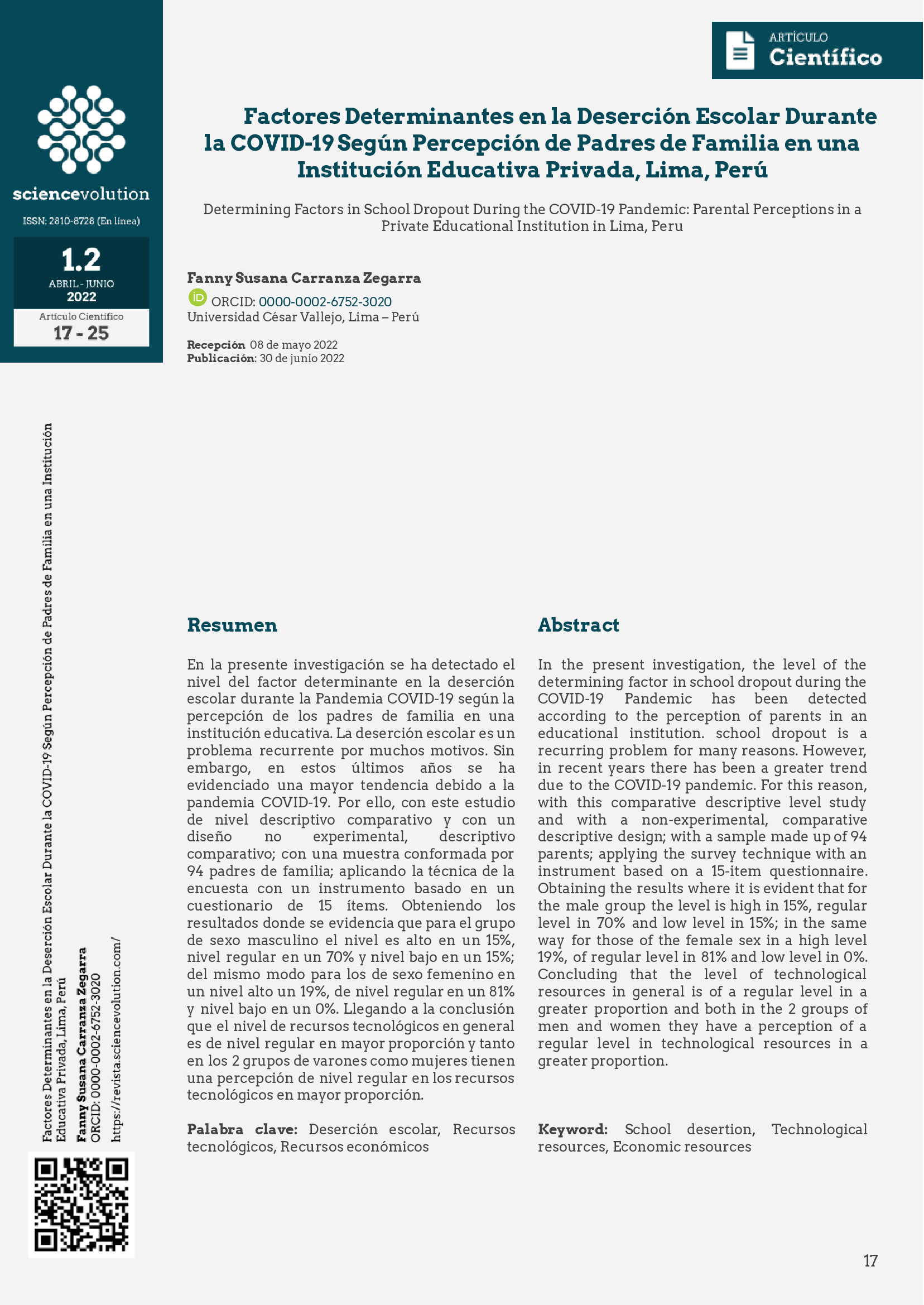Resumen
En la presente investigación se ha detectado el nivel del factor determinante en la deserción escolar durante la Pandemia COVID-19 según la percepción de los padres de familia en una Institución Educativa. La deserción escolar es un problema recurrente por muchos motivos. Sin embargo, en estos últimos años se ha evidenciado una mayor tendencia debido a la pandemia COVID-19. Por ello, con este estudio de nivel descriptivo comparativo y con un diseño no experimental, descriptivo comparativo; con una muestra conformada por 94 padres de familia; aplicando la técnica de la encuesta con un instrumento basado en un cuestionario de 15 ítems. Obteniendo los resultados donde se evidencia que para el grupo de sexo masculino el nivel es alto en un 15%, nivel regular en un 70% y nivel bajo en un 15%; del mismo modo para los de sexo femenino en un nivel alto un 19%, de nivel regular en un 81% y nivel bajo en un 0%. Llegando a la conclusión que el nivel de recursos tecnológicos en general es de nivel regular en mayor proporción y tanto en los 2 grupos de varones como mujeres tienen una percepción de nivel regular en los recursos tecnológicos en mayor proporción.
Citas
Arias, F. (2015) El proyecto de investigación: introducción a la metodología científica. Argentina. Editorial Episteme.
Baena, W. (2014) Planeamiento y análisis de investigaciones (8aed.) Caracas: El Dorado.
Beaunoyer, E., Dupéré, S. & Guitton, M. (2020). COVID-19 and digital inequalities: Reciprocal impacts and mitigation strategies. Computers in Human Behavior, 111. https://doi.org/10.1016/j.chb.2020.106424
COMEXPERÚ (2020). 230,000 estudiantes dejaron de ir al colegio en 2020. https://www.comexperu.org.pe/articulo/230000-estudiantes-dejaron-de-ir-al-colegio-en-2020
Lastre, K., López, L. &Alcázar, C. (2018). Relationship between family support and academic performance in Colombian primary school students. Psychogent, 21(39), 102-115. https://10.17081/psycho.21.39.2825
Mendoza Cazarez, D. C. (2019). Factors Affecting School Dropout and Completion in Mexico: Does Agency Matter? Journal of Human Development and Capabilities, 20(3), 311-328. https://www.tandfonline.com/doi/abs/10.1080/19452829.2019.1609917
Murillo, J. & Duk, C. (2020). El Covid-19 y las Brechas Educativas. Revista latinoamericana de educación inclusiva, 14(1), 11-13. Obtenido de http://dx.doi.org/10.4067/S0718-73782020000100011
Nenko, Y., Kybalna, N. & Snisarenko, Y. (2020). The COVID-19 Distance Learning: Insight from Ukrainian students. Revista Brasileira de Educação do Campo, 5, 1-19. https://doi.org/10.20873/uft.rbec.e8925
Omedes, E. (2020). Homeschooling' o educación en casa: la alternativa que varios padres se plantean durante la pandemia de coronavirus. https://www.20minutos.es/noticia/4355850/0/homeschooling-la-alterenativa-educativa-que-ha-aumentado-con-la-pandemia-de-coronavirus/?autoref=true
Ortega Murga, O. J., Quispe Ávalos, A. M., Navarro, B. C., & Tello Sifuentes, Y. (2021). La educación virtual en época de pandemia: Los más desfavorecidos en Perú. Horizontes. Revista de Investigación en Ciencias de la Educación, 5(21), 1456-1469. https://doi.org/Https://doi.org/10.33996/revistahorizontes.v5i21.28
Pachay-López, M. & Rodríguez-Gámez, M. (2021). La deserción escolar: Una perspectiva compleja en tiempos de pandemia. Polo de Conocimiento, 6(1), 130-155. https://10.23857/pc.v6i1.2129
Paredes-Chacín, A., Inciarte, A. & Walles-Peñaloza, D. (2020). Educación superior e investigación en Latinoamérica: Transición al uso de tecnologías digitales por Covid-19. Revista de Ciencias Sociales, 26(3), 98-117. https://doi.org/10.31876/rcs.v26i3.33236
Pérez García, Á. (2021). La enseñanza online post pandemia: Nuevos retos. Holos, 2, e12082. https://doi.org/10.15628/holos.2021.12082
Perú Legal (2021). Minedu: Más de 230 mil estudiantes abandonaron las aulas por la pandemia. https://perulegal.larepublica.pe/covid-19/2021/08/17/covid-19-mas-de-230-mil-estudiantes-abandonaron-las-aulas-por-la-pandemia-564
Porlán, R. (2020). El cambio de la enseñanza y el aprendizaje en tiempos de pandemia. Revista de educación ambiental y sostenibilidad, 2(1), 1502. https://10.25267/Rev_educ_ambient_sostenibilidad.2020.v2.i1.1502
UNESCO. (2020). COVID-19 Panorama de las estrategias de respuesta respecto a los exámenes y evaluaciones de alto impacto o altas consecuencias. https://en.unesco.org/sites/default/files/unesco-covid-19-ed-webinar-4-working-document-es.pdf
UNICEF (2021). Dos tercios de los niños en edad escolar del mundo no tienen acceso a Internet en el hogar. https://www.unicef.org/es/comunicados-prensa/dos-tercios-ninos-edad-escolar-mundo-no-tienen-acceso-internet-en-hogar
Vera, A. B. G., Vera, M. K. G., Garcia, A. M. R., & Miranda, M. J. V. (2019). Application of self-evaluation and co-evaluation on learning processes. International Journal of Linguistics, Literature and Culture, 5(5), 7-14. https://doi.org/10.21744/ijllc.v5n5.727
Viera Castillo, D., Flore, M. & Pachari-Vera, E. (2020). Factores de deserción estudiantil: un estudio exploratorio desde Perú. Interciencia, 45(12), 568-573. https://www.redalyc.org/journal/339/33965363005/html/
Yoga, I. M. S., Korry, N. P. D. P., &Yulianti, N. M. D. R. (2019). Information technology adoption on digital marketing communication channel. International Journal of Social Sciences and Humanities, 3(2), 95-104. https://doi.org/10.29332/ijssh.v3n2.297

Esta obra está bajo una licencia internacional Creative Commons Atribución-NoComercial-SinDerivadas 4.0.
Derechos de autor 2022 http://revista.sciencevolution.com/

